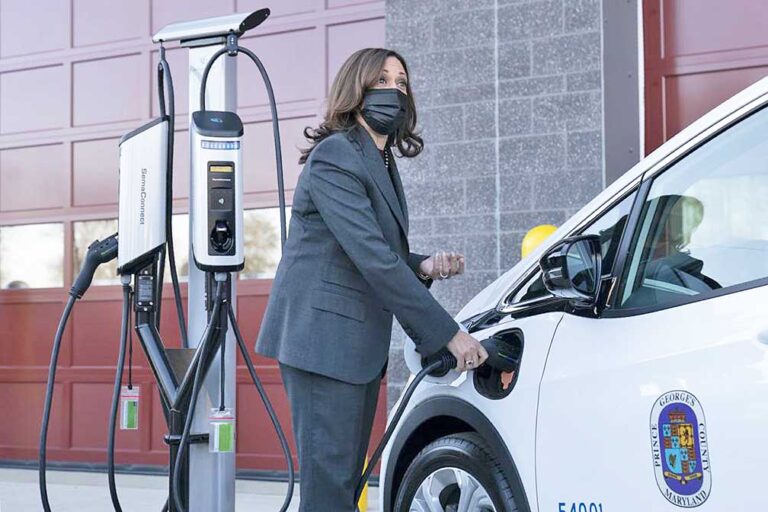WASHINGTON – The Biden administration has released an ambitious federal strategy to build 500,000 charging stations for electric vehicles across the country and bring down the cost of electric cars with the goal of transforming the U.S. auto industry.
“The future of transportation in our nation and around the world is electric,″ Vice President Kamala Harris said at an EV charging facility in suburban Maryland on Monday. “We want to make electric vehicles accessible for everyone. Absolutely make it accessible for everyone and easy. Just like filling up your car with gas.”
Meanwhile, U.S. Secretary of Energy Jennifer M. Granholm and U.S. Secretary of Transportation Pete Buttigieg on Wednesday signed a memorandum of understanding to create a Joint Office of Energy and Transportation that will help facilitate that plan.
The office will support the deployment of $7.5 billion from the President’s Bipartisan Infrastructure Law to build out a national electric vehicle charging network with a focus on filling gaps in rural, disadvantaged and hard-to-reach locations, according to a news release from the U.S. Department of Energy.
“This is a critical component of the President’s plan to accelerate the adoption of electric vehicles, address the climate crisis and support domestic manufacturing jobs,” the news release stated.
President Biden’s Bipartisan Infrastructure Law directs both agencies to collaborate on new programs and initiatives, including the new joint office, that will support the transition of the nation’s transportation systems, which currently accounts for 29% of all U.S. carbon pollution, to electric vehicles and other zero-carbon technologies.
“We are embarking on a transformative path to modernize the way we get to around in this country, making sure all Americans have the option to choose electric vehicles and spend less at the pump while making our air healthier,” Granholm said.
“Our two agencies will work together to deliver on President Biden’s historic investments in the Bipartisan Infrastructure Law, starting today with a joint project to build hundreds of thousands of electric vehicle charging stations, to tackle the climate crisis and create manufacturing and construction jobs at the same time.”
Buttigieg said that “Transportation is responsible for the most greenhouse gas emissions of any sector in our economy – so it can and must be a big part of the solution to the climate crisis. With this announcement by DOT and DOE, we are taking a big step forward on climate by helping make the benefits of EVs more accessible for all Americans.”
The Joint Office will help to accelerate effective deployment of a convenient, reliable, affordable, and equitable national network of charging stations. The Office will provide technical assistant to States and localities so that they can strategically build electric vehicle charging stations and other infrastructure. This assistance will include helping states develop comprehensive plans for charging station networks to guide the implementation of the $7.5 billion program.
Both agencies are tasked with implementing investments in zero-emission vehicle passenger, transit and heavy-duty vehicles that create cleaner and more affordable transportation options for all Americans. These investments support President Biden’s executive order in August setting a national goal of half of all new vehicles sold in the United States being electric by 2030.
The early work of the Joint Office of Energy and Transportation will be largely centered on EV charging provisions of the Bipartisan Infrastructure Law, including:
- Supporting the development of guidance and standards for the Bipartisan Infrastructure Law’s electric vehicle charging programs.
- Providing technical assistance to state and localities to strategically deploy EV charging infrastructure and provide the data and tools needed to help develop state EV charging plans.
- Providing technical expertise and assistance to other transportation electrification programs.
“In response to the lack of electric vehicle charging infrastructure in traditionally underserved communities, the Joint Office will provide technical assistance and analytical support to states as they develop electric vehicle charging plans to ensure this investment contributes to the Administration’s Justice40 Initiative, which requires delivering at least 40% of the benefits from Federal climate and clean energy investments to underserved communities,” the news release stated.
“To grow the clean transportation workforce and accelerate the construction of charging stations across the country, the Office will support career training and certification programs to strengthen career pathways for Americans and create good-paying jobs that will lead the transition to cleaner, more sustainable future.”
The auto and trucking industries are already moving toward electric vehicles, Harris added: “We need to make the shift faster and make sure it is driven by the United States.″
When public chargers are installed in rural, urban or suburban neighborhoods, “we make it easier for people to go electric,″ Harris said, adding that the biggest barrier most people cite to buying an electric car is “figuring out where and how to charge it.″
People who live in apartments may not have a private driveway where they can install a plug, she said, while rural residents may have to drive miles to the nearest charger.
Harris visited a maintenance facility in Brandywine, just outside Washington, where she received a demonstration of how chargers work and learned about a plan to electrify the government fleet in Maryland’s Prince George’s County.
“There’s no sound or fume!” Harris exclaimed as she charged one of the county’s vehicles. “How do I know it’s actually working?” she asked with a laugh.
The car is fully charged when the display is a steady green, said Mahidhar Reddy, CEO and founder of SemaConnect, a Maryland company that made the charging station.
Biden has set a goal that electric cars and trucks account for half of new vehicles sold by 2030.
The LMC Automotive consulting firm expects U.S. sales of new fully electric vehicles to hit nearly 400,000 this year, almost double last year’s figure. EVs still make up only about 2.6% of sales, but the firm expects sales to grow to more than 730,000 next year and more than 2 million by 2025.
Even at 2 million, EV sales still would be only about 12% of U.S. new vehicle sales.
Republicans, including some who voted in favor of the new infrastructure law, have criticized Biden for being preoccupied with electric vehicle technology when Americans are contending with a spike in gasoline and natural gas prices.
Republicans and Sen. Joe Manchin, D-W.Va., also criticize a proposal in the Democratic bill that would offer an additional $4,500 tax credit for a vehicle made at a U.S. plant that operates under a union-negotiated collective bargaining agreement. Louisiana Rep. Steve Scalise, the No. 2 House Republican, called the plan a “handout to union bosses” that would penalize car makers with non-union workers.
Biden last month ordered a record 50 million barrels of oil released from America’s strategic reserve, in coordination with other major energy consuming nations. Gas prices have fallen in recent weeks as fears grow of another possible economic slowdown from the ongoing coronavirus pandemic.
The Associated Press contributed to this report.
The Trucker News Staff produces engaging content for not only TheTrucker.com, but also The Trucker Newspaper, which has been serving the trucking industry for more than 30 years. With a focus on drivers, the Trucker News Staff aims to provide relevant, objective content pertaining to the trucking segment of the transportation industry. The Trucker News Staff is based in Little Rock, Arkansas.











